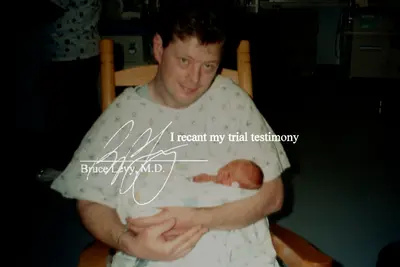Pamela Colloff
My reporting explores the criminal justice system, particularly the ways in which it falls short of delivering justice.
Need to Get in Touch?
I welcome tips from anyone — attorneys, defendants, victims’ families, concerned citizens — who want to shed light on an injustice.
What I Cover
I write about issues like prosecutorial misconduct, unreliable expert witness testimony, junk forensic science, and official indifference to innocence and error. Each of my stories involves extensive time on the ground, getting to know the people and places I’m chronicling. I strive to illuminate complex issues with rigorous reporting and engaging, fact-driven storytelling.
My Background
I’m a reporter at ProPublica and a staff writer at The New York Times Magazine. My work has also appeared in The New Yorker and has been anthologized in “Best American Magazine Writing,” “Best American Crime Reporting,” “Best American Nonrequired Reading,” and “Next Wave: America’s New Generation of Great Literary Journalists.”
“False Witness,” my ProPublica-New York Times investigation into jailhouse informants, received a National Magazine Award for reporting in 2020. It was also recognized with the Hillman Prize, the IRE Award, the Taylor Family Award for Fairness in Journalism and the Molly National Journalism Prize.
Before joining ProPublica and The Times in 2017, I was a staff writer at Texas Monthly. A 2010 investigation of mine — about a wrongly convicted man who was sent to Texas’ death row — was credited with helping him win his freedom after 18 years behind bars.
In 2014, the Nieman Foundation for Journalism at Harvard University awarded me the Louis M. Lyons Award for Conscience and Integrity in Journalism.
I live in Austin, Texas, with my husband and two children.
He Was Convicted of Killing His Baby. The DA’s Office Says He’s Innocent, but That Might Not Be Enough.
When new scientific evidence casts doubt on convictions, the justice system has no easy path to freedom — even when it’s the prosecutors doing the asking.
by Pamela Colloff, photography by Stacy Kranitz,
Blood Will Tell: Did This Texas Principal Really Kill His Wife?
The murder of Mickey Bryan, a quiet fourth-grade teacher, stunned her small Texas town. Then her husband, a beloved high school principal, was charged with killing her. Did he do it, or had there been a terrible mistake?
by Pamela Colloff,
Blood Will Tell, Part II
Joe Bryan has spent the past three decades in prison for the murder of his wife, a crime he claims he didn’t commit. His conviction rested largely on “bloodstain-pattern analysis” — a technique still in use throughout the criminal-justice system, despite concerns about its reliability.
by Pamela Colloff,
He’s a Liar, a Con Artist and a Snitch. His Testimony Could Soon Send a Man to His Death.
Paul Skalnik has a decadeslong criminal record and may be one of the most prolific jailhouse informants in U.S. history. The state of Florida is planning to execute a man based largely on his word.
by Pamela Colloff,
He Frantically Called 911 to Revive His Infant Son. Now He Could Face 12 Years in Prison.
Exonerations and new science continue to raise questions about shaken baby syndrome, a diagnosis that lives on under a different name: “abusive head trauma.” Critics say the name deflects scrutiny while leaving parents vulnerable to criminal charges.
by Pamela Colloff,
Medical Examiner, Whose Testimony Helped Convict a Man in 2004 of Killing His Baby, Now Says He Was Wrong
The former Nashville medical examiner has recanted his testimony that Russell Maze’s son had died of shaken baby syndrome, joining the DA’s office in now saying a crime never occurred. Yet Maze could still spend the rest of his life in prison.
by Pamela Colloff,
Is It Forensics or Is It Junk Science?
Dubious forensic techniques have spread throughout the criminal justice system for decades. Here’s what ProPublica has learned about junk forensic science techniques and how they proliferate.
by Sophia Kovatch, Pamela Colloff and Brett Murphy,
33 Years After Dubious Evidence Helped Convict Him, Joe Bryan Has Been Released on Parole
His murder conviction rested largely on bloodstain-pattern analysis, a technique still in use throughout the criminal justice system, despite concerns about its reliability.
by Pamela Colloff,
Convicted Based on Lies
These 10 men went to prison after prosecutors relied on the dubious accounts of jailhouse informants. Years later, each of them was exonerated.
by Pamela Colloff and Katie Zavadski,
A Liar Put Him on Death Row. His Co-Defendant Could Help Set Him Free. Why Won’t He?
Reversing course, a key witness who could help James Dailey stays silent in a Florida case that was built on dubious jailhouse informant testimony. Dailey could face execution.
by Pamela Colloff,
A Liar’s Testimony Convinced a Jury to Convict a Man of Murder. Will Florida Execute Him Anyway?
A federal judge says key testimony used to convict James Dailey of murder was likely false. Dailey’s co-defendant has asserted — again — that Dailey had no involvement in the crime. So far, that hasn’t made a difference in the courts.
by Pamela Colloff,
Joe Bryan Denied Parole for Seventh Time
Though a forensic expert who testified against Bryan has admitted his conclusions were wrong, Bryan will remain behind bars.
by Pamela Colloff,
Bloodstain Analysis Convinced a Jury She Stabbed Her 10-Year-Old Son. Now, Even Freedom Can’t Give Her Back Her Life.
Julie Rea was convicted of killing her son largely on the testimony of bloodstain-pattern analysts. She was later acquitted and exonerated, joining a growing community of Americans wrongly convicted with bad science.
by Pamela Colloff,
Joe Bryan in His Own Words: On Being Convicted With Expert Testimony That Turned Out to Be Wrong
In a moving interview, Bryan, who has spent 31 years in a Texas prison for the 1985 murder of his wife, talks about his life behind bars and trying keep hope alive.
by Pamela Colloff,











